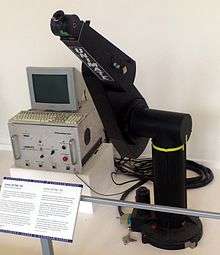Unimation
Unimation was the world's first robotics company. It was founded in 1956 by Joseph F. Engelberger and George Devol and was located in Danbury, Connecticut.[1] Devol had already applied for a patent an industrial robotic arm in 1954; U.S. Patent 2,988,237 was issued in 1961.[2][3] [4]
Devol collaborated with Engelberger, who served as president of the company, to engineer and produce an industrial robot under the brand name Unimate. They introduced their new robot in 1961 at a trade show at Chicago's Cow Palace.[2]
The first Unimate prototypes were controlled by vacuum tubes used as digital switches though later versions used transistors. Further, parts available off-the-shelf in the late 1950s, such as digital encoders, were not adequate for the Unimate, so with Devol's guidance and a team of skilled engineers, Unimation designed and machined practically every part in the first Unimates. They also invented a variety of new technologies, including a unique rotating drum memory system with data parity controls.
In 1960, Devol personally sold the first Unimate robot, which was shipped in 1961 to General Motors.[5] GM first used the machine for die casting handling and spot welding of car bodies.[6] The first Unimate robot was installed at GM's Inland Fisher Guide Plant in Ewing Township, New Jersey in 1961[7][8] to lift hot pieces of metal from a die-casting machine and stack them.[9] Soon companies such as Chrysler, Ford, and Fiat saw the necessity for large Unimate purchases.
The introduction of robotics to the manufacturing process effectively transformed the automotive industry,[2][10][11] with Chrysler and the Ford Motor Company soon following General Motors' lead and installing Unimates in their manufacturing facilities.[8] The rapid adoption of the technology also provided Unimation with a working business model: after selling the first Unimate at a $35,000 loss, as demand increased, the company was able to begin building the robotic arms for significantly less and thus began to turn a substantial profit.[12]
PUMA

The PUMA (Programmable Universal Machine for Assembly, or Programmable Universal Manipulation Arm) was developed by Victor Scheinman at Unimation in 1978. Initially developed for General Motors, the PUMA was based on the earlier Vicarm design Scheinman invented while at Stanford University.
Unimation produced PUMAs for years until being purchased by Westinghouse (ca. 1980), and later by Swiss company Stäubli (1988).
References
- ↑ "Invasion Of The Robots". Businessweek. March 2, 1997. Retrieved December 1, 2015.
- 1 2 3 Munson, George (December 2, 2010). "THE RISE AND FALL OF UNIMATION, INC. – Story of robotics innovation & triumph that changed the world!". Retrieved December 1, 2015.
- ↑ Modern Robotics: Building Versatile Machines (2006) by Harry Henderson [ISBN 978-0816057450], pp. 31-4
- ↑ Robots: Explore the World of Robots and How They Work for Us (2015) by Rick Leider [ISBN 978-1632204394]
- ↑ ""Unimate." Encyclopædia Britannica. 2008. Encyclopædia Britannica Online. 08 Oct. 2008". Britannica.com. Retrieved 2012-03-15.
- ↑ "The History and Benefits of Industrial Robots". Used-Robots.com. Retrieved 2012-03-15.
- ↑ "Unimate". Razor Robotics. Retrieved December 1, 2015.
- 1 2 Pearce, Jeremy (August 15, 2011). "George C. Devol, Inventor of Robot Arm, Dies at 99". Retrieved December 1, 2015.
- ↑ Mickle, Paul. "1961: A peep into the automated future", The Trentonian. Accessed August 11, 2011. "Without any fanfare, the world's first working robot joined the assembly line at the General Motors plant in Ewing Township in the spring of 1961.... It was an automated die-casting mold that dropped red-hot door handles and other such car parts into pools of cooling liquid on a line that moved them along to workers for trimming and buffing. Its most distinct feature was a grip on a steel armature that eliminated the need for a man to touch car parts just made from molten steel."
- ↑ Kilbane, Doris (December 1, 2008). "Joseph Engelberger: Robotics Move From Industry To Space To Elder Care". Electronic Design. Retrieved December 1, 2015.
- ↑ "Joseph F. Engelberger, Father of Robotics". Robotics Industries Association. December 1, 2015. Retrieved December 1, 2015.
- ↑ Spice, Byron (November 11, 2003). "4 robots clank into Hall of Fame; 2 fictional, 2 real". Pittsburgh Post-Gazette. Retrieved December 1, 2015.